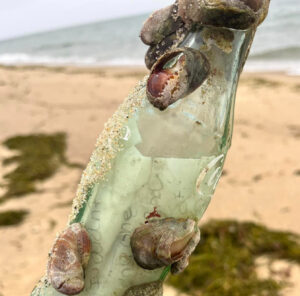 HYANNIS – Undoubtedly, you’ve heard about norovirus. Ugh.
HYANNIS – Undoubtedly, you’ve heard about norovirus. Ugh.
Cruise ship passengers hit with vomiting and diarrhea. Outbreaks traced to restaurants – remember last year’s closings of some members of the Chipotle chain? The bug also derailed serving of raw oysters at last fall’s OysterFest in Wellfleet.
No doubt someone you know recently had the “stomach flu” and it raced through their family.
“Lots of other viruses cause gastroenteritis (inflammation of the stomach and intestines),” said Nicole Salter, NP, a nurse practitioner with Emerald Physicians in Falmouth. “Norovirus is the most common.”
You can catch norovirus any time of year, but infections peak from January through March, according to the U.S. Centers for Disease Control and Prevention. It causes about 19 million to 21 million cases annually in the United States, and between 570 and 800 deaths, on average. Worldwide it sickens 685 million people a year, and kills 50,000 children in developing countries, so it’s serious stuff.
Norovirus is extremely contagious. While a person generally has symptoms for only two or three days, they may be spreading the virus for one or two days before symptoms begin and for up to two weeks after symptoms cease, Salter said.
Norovirus symptoms, according to the CDC:
- Diarrhea
- Nausea and vomiting
- Fever
- Headache and body aches
Dehydration symptoms:
- Low volume of urine
- Dry mouth and throat
- Dizziness upon standing
- Children may lack tears when crying and be unusually fussy
Wash Hands Thoroughly
The best defense against norovirus: soap and water. Wash hands for at least 20 seconds, Salter said, which is about the time it takes to sing “Happy Birthday” twice. Alcohol hand sanitizers, alone, won’t do the trick, according to the CDC.
“Washing your hands can reduce gastroenteritis, in general, (from all causes, including norovirus) by 47 percent,” Salter said.
It takes as little as 18 microscopic particles of the virus to cause infection, she said.
The CDC says the virus can survive for days or even weeks on surfaces and resists being killed by some disinfectants. All that makes cleaning up after yourself or an ill family member a formidable task.
“If you missed a pinhead, you could get it on your hand, touch your mouth and be infected,” Salter said.
The CDC recommends cleaning surfaces with a diluted solution of bleach in water – five to 25 tablespoons of bleach per gallon of water, all while wearing protective gloves. Clean soiled laundry with detergent for the longest setting on your washing machine and machine dry them on high heat.
Infected people should not prepare food or take care of others for at least two to three days after symptoms stop and infected children should be kept out of the kitchen, the CDC recommends.
Norovirus is the leading cause of food-borne illness and can be caused by contagious restaurant workers or food contaminated in the field, most commonly shellfish, leafy greens and fresh fruits and vegetables, according to the CDC. It recommends cooking shellfish above 140 degrees and washing fruits and vegetables before serving them.
Massachusetts has a state ban on workers in food industries returning to their jobs before three days after norovirus symptoms have stopped. The law also applies to workers who feed, provide oral care or give medications in schools, day-care or health facilities and residential programs, according to the state Department of Public Health.
What Can You Do?
There’s no vaccine to prevent infection, because many strains of norovirus exist. Having caught it once doesn’t mean you’re immune, Salter said. Nor is there an effective medicine to treat it. Most patients simply have to suffer through symptoms for a few days, and try to stay hydrated. In some cases, symptoms can last up to two weeks, and patients who still have symptoms after a week should seek medical help, Salter said.
The same goes for those most vulnerable to becoming seriously ill, including infants, pregnant women, the elderly and people with chronic diseases, she said.
“Red flags: Any blood in the stool, tarry stools, significant weight loss,” Salter said.
She also said to alert your doctor if you have severe abdominal pain or had a recent hospitalization or taken antibiotics, as you may have “C. diff” (Clostridium difficile, a bacterial infection of the intestines), and not norovirus.
Avoid taking anti-diarrheal medicines, Salter said, as they will only prolong your body’s attempt to clear the infection. A doctor may prescribe anti-nausea medicine or intravenous fluids for severe cases, she said.
Do stay hydrated by drinking Gatorade, Pedialyte or similar liquids that replenish water and electrolytes, Salter said. Avoid high-sugar drinks, such as fruit juices or soda, she added. Also, alcoholic and caffeinated beverages can contribute to dehydration, so skip those, too, the CDC says. Salter suggested that when you’re able to keep food down, start with a bland BRAT diet (bananas, rice, applesauce and toast).
























